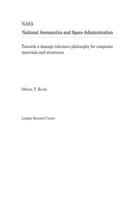
Towards a Damage Tolerance Philosophy for Composite Materials and Structures
Series:
A damage-threshold/fail-safe approach is proposed to ensure that composite structures are both sufficiently durable for economy of operation, as well as adequately fail-safe or damage tolerant for flight safety. Matrix cracks are assumed to exist throughout the off-axis plies. Delamination onset is predicted using a strain energy release rate characterization. Delamination growth is accounted for
NaN
VOLUME
English
Paperback

A damage-threshold/fail-safe approach is proposed to ensure that composite structures are both sufficiently durable for economy of operation, as well as adequately fail-safe or damage tolerant for flight safety. Matrix cracks are assumed to exist throughout the off-axis plies. Delamination onset is predicted using a strain energy release rate characterization. Delamination growth is accounted for in one of three ways: either analytically, using delamination growth laws in conjunction with strain energy release rate analyses incorporating delamination resistance curves; experimentally, using measured stiffness loss; or conservatively, assuming delamination onset corresponds to catastrophic delamination growth. Fail-safety is assessed by accounting for the accumulation of delaminations through the thickness. A tension fatigue life prediction for composite laminates is presented as a case study to illustrate how this approach may be implemented. Suggestions are made for applying the damage-threshold/fail-safe approach to compression fatigue, tension/compression fatigue, and compression strength following low velocity impact. Obrien, T. Kevin Langley Research Center...
Price Comparison [India]
In This Series
Bestseller Manga
Trending NEWS




















